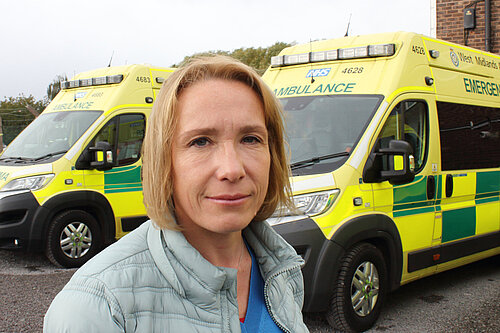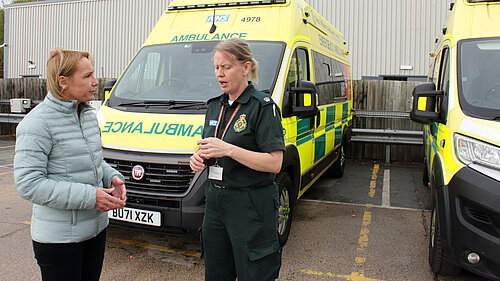
Helen Morgan responds to new Shropshire ambulance data
MP and health campaigner Helen Morgan has said she remains ‘worried sick’ about emergency care in Shropshire but is relieved that some progress has been made.

North Shropshire MP Helen Morgan has told the Government to stop passing the buck to local health leaders and urgently set out a strategy to tackle ambulance delays as the number of serious incidents in the region increased by nearly 300% in one year.
West Midlands Ambulance Service (WMAS) bosses expect 48,000 hours to be lost due to delays handing over patients to hospital in July alone - the equivalent of 2,000 full days where ambulances are stranded at hospitals instead of being out treating patients.
This figure has nearly tripled in one year, with the monthly record broken eight out of the last 13 months in the West Midlands.
The number of serious incidents where patients are being put at harm is also rising – with 111 recorded already this year when there were 28 in the same period last year, an increase of 296%.
Helen Morgan MP said: “The Government is failing paramedics, failing hospital staff and failing patients by refusing to take this crisis seriously.
“Ambulance delays, which are worst in rural areas like North Shropshire, will not improve until we have a clear strategy from the Government which addresses the many underlying problems which have combined to nearly paralyse our health system.
“Local health leaders are working desperately hard to find solutions but they have made it clear that the only real solution is a national strategy. Steve Barclay needs to deliver one ASAP and implement it before winter pressures kick in.
“As the Conservatives continue to pass the buck, patients will continue to die and it will be nurses, doctors and paramedics and not Government ministers who are forced to deal with the consequences.”
Ambulance bosses have been working hard to find solutions but have made it clear that the issue can only be addressed at a national level.
A report to the WMAS board ahead of its meeting today (WEDS) made clear that a national strategy is the only way to reduce handover delays due to the unprecedented pressure on emergency departments and hospitals wards.
It said: “The scale of the problem is such, a much wider regional / national strategy is required to tackle the route causes [sic] of critically high occupancy in Emergency Department, which is the absolute lack of available beds. “
Concerns have also been raised about the impact on the development of paramedics, with students struggling to learn as they spend many of their shifts waiting at hospitals instead of being out learning new skills.
The number of serious incidents related to clinical practice has also increased, WMAS said.
Helen Morgan added: “Instead of getting better, the staffing crisis could get worse as frontline medics prioritise their own wellbeing by leaving to work elsewhere instead of working under intense pressure day and night.
“Attrition rates have doubled at West Midlands Ambulance Service in recent months and staff are getting more inexperienced as a result. Half of the 999 staff at WMAS have been there less than five years and instead of gaining experience treating patients, paramedics now spend many of their shifts waiting outside hospitals.
“This is not remotely their fault and yet they are the ones faced with a rise in serious incidents, a rise in complaints and a ‘new normal’ of not reaching heart attack patients for up to four hours.”
Key points